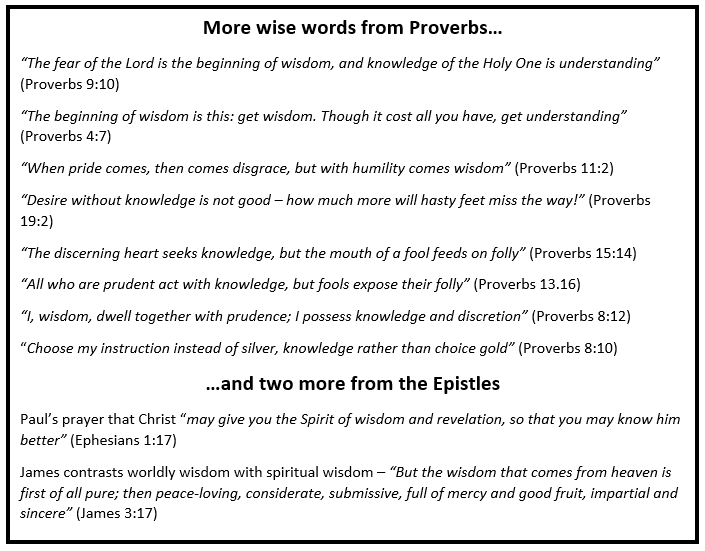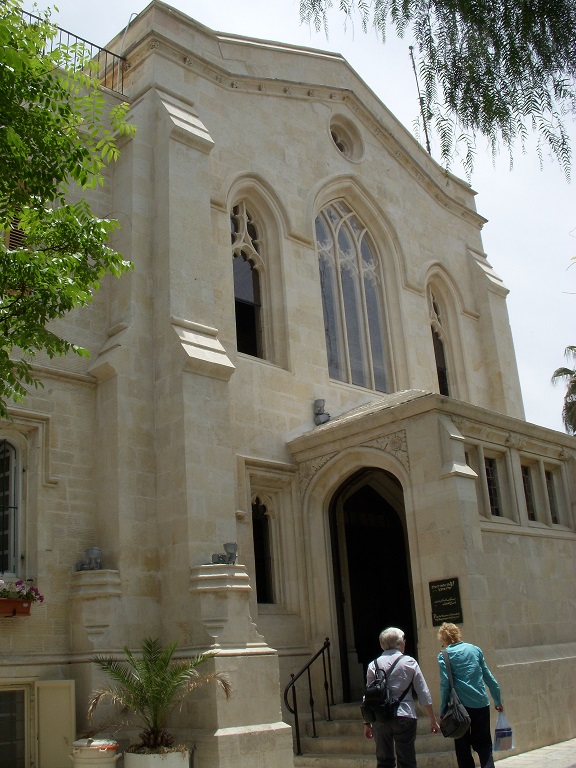The first two manifestations of 1 Corinthians 12.
This article is part of a series. Click here for the archive.
“To one there is given through the Spirit a message of wisdom, to another a message of knowledge by means of the same Spirit” (1 Corinthians 12:7-10)
“In Christ are hidden all the treasures of wisdom and knowledge” (Colossians 2:3)
The introduction to this part of the series established a few background details about the manifestations and put them in the context of their surrounding chapters and verses. Bearing this in mind we will now look at the first two of the ‘gifts' listed in 1 Corinthians 12: ‘wisdom’ and ‘knowledge’.
It is important that we look at the two together as they invariably need each other and can be ineffective if they operate on their own. Although knowledge can appear to be good, it is of little use unless you also have wisdom to apply it in the right way – and vice versa. The one relies on the other to be truly effective.
As manifestations of the Spirit, they are given to whom - and when - and wherever the Spirit wills. They are not given to any one person permanently. Neither do they operate in the ways of the world; the world has its wise men as well as those who have amassed knowledge and they do have their place – but in affairs of the Spirit the Lord sees things differently. We are commissioned and sent, as Paul was, “to preach the gospel – not with wisdom and eloquence, lest the cross of Christ be emptied of its power” (1 Cor 1:17).
The Spiritual Nature of Knowledge and Wisdom
So what is this knowledge and wisdom that is mentioned here in 1 Corinthians 12? Proverbs 2 (the whole chapter) is an excellent help in understanding the true meaning of this. The writer starts by saying to his children that “if you accept my words and store up my commands within you, turning your ear to wisdom and applying your heart to understanding – indeed, if you call out for insight and cry aloud for understanding…then you will understand the fear of the Lord and find the knowledge of God” (vv1-5).
He continues, “For the Lord gives wisdom; from his mouth come knowledge and understanding” (v6); “for he guards the course of the just and protects the way of his faithful ones” (v7). “Then you will understand what is right and just and fair – every good path. For wisdom will enter your heart, and knowledge will be pleasant to your soul” (vv9-10).
Knowledge is to know the facts; wisdom is to know what to do with them.
These insights continue throughout the rest of the chapter, describing how discretion and understanding will guard you and wisdom will save you from evil distractions so that you will keep to the paths of the righteous. True knowledge and wisdom come from knowing God, understanding his will by studying his word and seeking to stay close to him at all times.
Bestowed on Jesus
The prophetic words in the Old Testament speak of wisdom, understanding, counsel, might, knowledge and fear having been bestowed on Jesus Christ by the Holy Spirit:
A shoot will come up from the stump of Jesse; from his roots a Branch will bear fruit. The Spirit of the Lord will rest on him – the Spirit of wisdom and of understanding, the Spirit of counsel and of might, the Spirit of the knowledge and fear of the Lord – and he will delight in the fear of the Lord. He will not judge by what he sees with his eyes, or decide by what he hears with his ears; but with righteousness he will judge the needy, with justice he will give decisions for the poor of the earth. (Isaiah 11:1-5)
Knowledge, wisdom and understanding in the ways of God were the essence of Jesus’s ministry and the Holy Spirit ensures that these are available to his followers, albeit as manifestations rather than as actual gifts. “We continually ask God to fill you with the knowledge of his will through all the wisdom and understanding that the Spirit gives” (Col 1:9, emphasis added).
The Tribe of Issachar
In the time before the advent of Christ, an understanding of the ways of God usually came to individuals such as priests and prophets and this information was then passed on to the people – but there are also records of a whole tribe being gifted in this way.
We know that when the Lord turned Saul’s kingdom over to David at Hebron he received support in the form of fighting men from all the different tribes, except the Tribe of Issachar who sent men of wisdom and knowledge: “from Issachar, men who understood the times and knew what Israel should do – 200 chiefs, with all their relatives under their command” (1 Chron 12:32).
Today, followers of Christ all have the opportunity to have that close relationship with the Father and receive knowledge in order to bless others, and to help their communities and even their nations understand what is happening around them and to know the right steps to take.
To know God’s will is to have wisdom.
Back to Origins (or Translations!)
1 Corinthians 12:8 speaks of the gifts of wisdom and knowledge being given as ‘messages’ - the “message of wisdom” and the “message of knowledge”. The word being translated here as ‘message’ is the Greek word logos, which in the King James version is translated as 'word' and in the RSV as 'utterance'. Each translation gives the impression of something quite concise, often no more than a sentence or two. 'Utterance' can imply speaking forth generally, rather than to just one person.
Both gifts as described in this passage have a strong speaking element rather than a doing element, which the New Life version translates as just “the gift of teaching words of wisdom or what he has learned and knows”; The Living Bible as “the ability to give wise advice; someone else may be especially good at studying and teaching”; JB Phillips version as “One man’s gift by the Spirit is to speak with wisdom, another’s to speak with knowledge”. And The Message just has “wise counsel and clear understanding”.
Special Revelation
So we turn now to the expression of wisdom and the (closely associated) expression of knowledge. We are told “in Christ are hidden all the treasures of wisdom and knowledge” (Col 2:3), but the believer does not have a reservoir of wisdom and knowledge, from which he can draw at will. In these two gifts wisdom and knowledge are made available by special revelation in the needed moment through the believer, as the Spirit gives expression in his time and way.
The word 'revelation', which is used three times by Paul (1 Cor 14:6, 26 and 30), is probably used as a synonym for these two gifts of wisdom and knowledge: it is the Greek word apokalupsis, which literally means 'to take the covers off’ and this is the special function performed by these gifts. Paul says that he went up to Jerusalem “in response to a revelation” (Gal 2:2).
What About Manifestations Today?
We can understand the invaluable nature of spiritual knowledge and wisdom to ALL Christians as they grow to maturity and this comes with constant reading, study and understanding the word, alongside prayer. But is there something special about a message or word received as a spiritual manifestation by a selected few, as Paul intimates in his list here?
The desire to know all things, and especially to know the future, has always been with mankind, from the times of the oracles. Notoriously, gypsies have been reading crystals and palms for centuries, and the reading of horoscopes in newspapers is still sought after in a ‘secular’ world. Christians have often viewed these either as a bit of fun or as evil and coming from the wrong spirit.
If knowledge is to know the word of God, spiritual wisdom is to understand God’s will for service.
The idea of manifestations of the Holy Spirit became more generally accepted again among Christians following the birth of the Pentecostal movement last century, but words of knowledge have gained more prominence in the Charismatic movement.
John Wimber’s definition of knowledge was, reportedly: "This is the supernatural revelation of fact about a person or situation, which is not learned through the efforts of the natural mind, but is a fragment of knowledge freely given by God, disclosing the truth which the Spirit wishes to be made known concerning a particular person or situation".1 One lesson we must learn from the Charismatic movement is that we need to lay a greater emphasis upon ‘distinguishing between the spirits’ that bring these words (we feel that this is doubly necessary with words of prophecy and we will look at this next time).
Another lesson we must learn from the Charismatic movement is who words of wisdom and knowledge are intended for. Whereas some Christians think that words of knowledge and wisdom are mainly for individuals (or for specific occasions) and are synonymous with personal prophecies or prophetic words, others feel they give an individual the power to proclaim the message or, as the Amplified Version says: “To one is given through the [Holy] Spirit [the power to speak] the message of wisdom, and to another [the power to express] the word of knowledge and understanding according to the same Spirit” (1 Cor 12:7-8).
It is important to remember that each of the gifts are intended for the good (or the ‘profit’, YLT) of the whole community.2 So the question we need to ask is: are personal words of wisdom and knowledge truly biblical? If so, how do they benefit the whole community? Whatever decision you reach, all of them when exercised should manifest the Spirit’s power and presence.
Final Words…
God keeps before him in the storehouse of his mind all the facts of heaven and earth. He knows everything about every person. He knows every event, every reaction, every intention and every consequence – past, present and future. Therefore he can uncover any information we may need and he can reveal what should be done in any situation. It would be utter foolishness to ignore the potentiality of these gifts.
The manifestations of wisdom and knowledge reveal the love of the Lord for his people: they are audible and have visible consequences - unlike the fruits of the Spirit which are invisible graces. When Jesus turned water into wine John records, “He thus revealed his glory and his disciples put their faith in him” (John 2:11). These manifestations of the Spirit result in God's people seeing his glory and believing more confidently than ever. They also demonstrate to unbelievers that the God we worship is alive, interested and powerful.

References
1 Derived from this site.
2 The gift of the message of wisdom is that 'speaking by the Spirit of God' which manifests some part of God's total wisdom for the direction of the body of Christ; and the gift of the message of knowledge is that 'speaking by the Spirit of God' which manifests some part of God's total knowledge for the information of the body of Christ.







